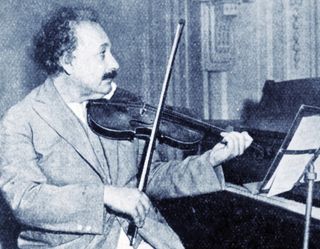Albert Einstein was allergic to authoritarians.
His dislike of dogma, playful nature, and ability to constructively concentrate let him visualize unorthodox ways the universe might operate. Some of these proved to be true. Daydreaming his way to deeper understandings was his superpower. It can be ours, too.
Through internal journeys of pure thought, Einstein looked behind the apparent reality of the day-to-day to glimpse the counterintuitive mechanisms that prop up what we believe to be true. By this process, Albert Einstein turned Isaac Newton's universe of absolutes inside out.
Related: Is Einstein's 'theory of happiness' as successful as general relativity?
CLOSE
Einstein's General Relativity Proven for 1st Time 100 Years Ago
0 seconds of 4 minutes, 29 secondsVolume 0%
Einstein saw what others had missed by remaining radically open-minded. It would come to be called his theory of special relativity: A 1905 paper that resolved an apparent conflict between finite speed of light and the invariable laws of physics. But it did so with eerie consequences: Clocks in motion seem to slow down compared to clocks "at rest." What looks like a pair of simultaneous events to one spectator may look widely spaced in time to another. Physical items in motion seem to contract along the dimension they're moving. It's unsettling, but it works for all objects in motion, as long as they don't speed up or slow down.
Einstein dreamed on. He yearned for relativity to hold true when entities accelerated. Through "thought-experiment," he realized that a person standing a windowless box could not know whether that box was parked in a gravity field or rushing "upward" through space. The effects would be equivalent. So, were they really different? This led Einstein to postulate gravity not as an invisible force, as convention dictated, but as nothing more than the curvature of space around an object.
But how to predict the degree of deformation? The simple geometry of Euclid that had supported Newton's universe wouldn't be up to the task. Neither would Einstein, not by himself. He set to work with the mathematician Marcel Grossman, arming themselves with the curved space geometry of Bernhard Riemann and others. It took the pair three years to fully generalize relativity within a rigorous mathematical framework. Contrary to his later public reputation, Einstein was never a lone wolf.
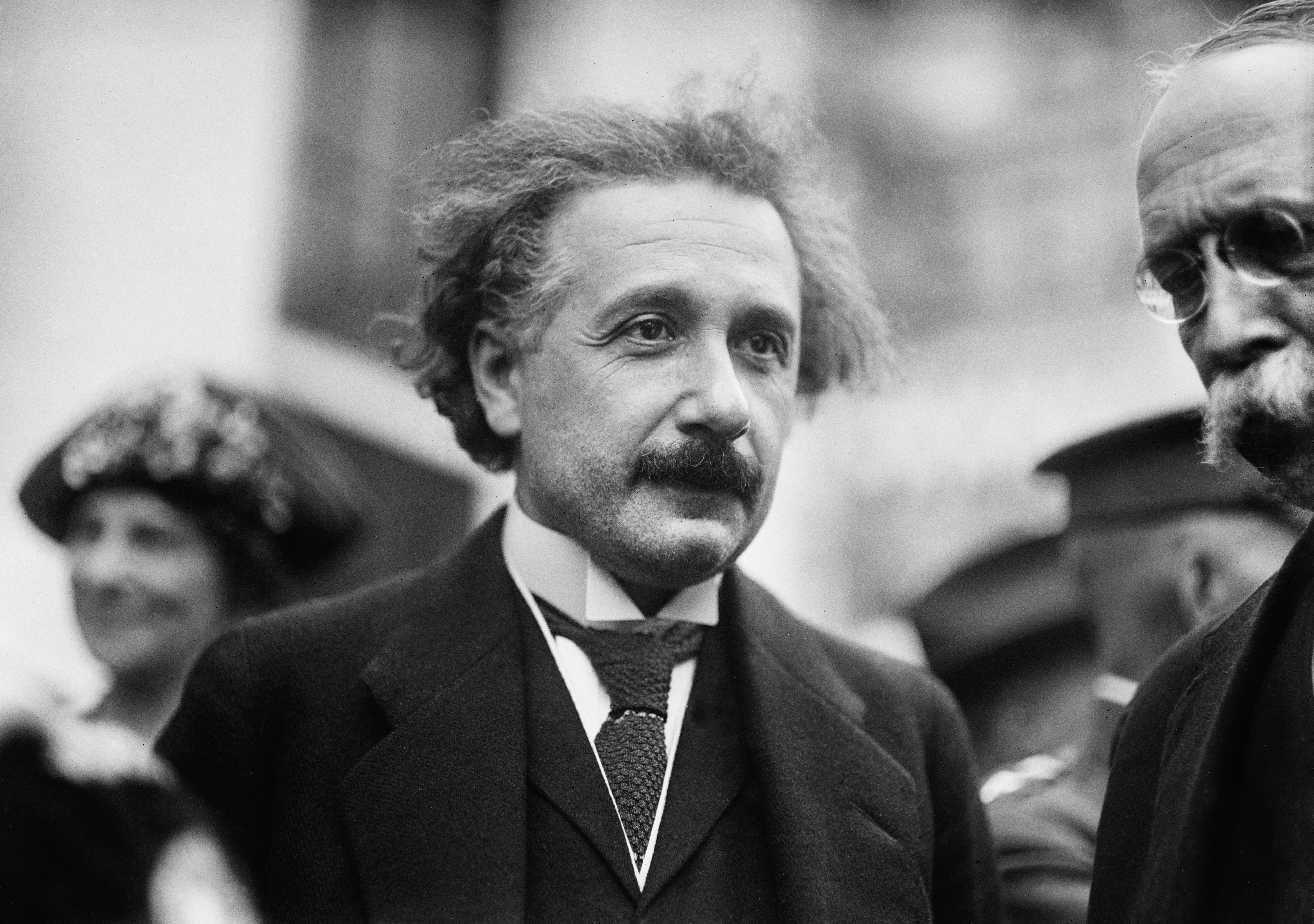
General relativity could then be tested: Light should bend around the dimple in spacetime created by a massive body. Einstein had calculated in 1911, and revised in 1915, the degree to which starlight must curve around the sun [1.7 seconds of arc displaced from their measured position without the sun in between]. The solar eclipse of May 29, 1919, revealed exactly this. Announced in November, the confirmation made global headlines. Einstein's name burst beyond the province of science. He would soon acquire superstar visibility, which became a platform for voicing his thoughts beyond the sphere of science.
Einstein's innately contrarian inclinations had enabled him to revolutionize physics. They also let him see beyond tribalism into an enlightened realm of human tolerance. He would, for the rest of his life, leverage his fame to champion peaceful diversity.
Simple relativities
Einstein's infectious positivity can help us navigate these confusing and contentious times. His ability to encapsulate, in an aphorism, a deep truth we can feel can lift us up.
To that end, may I offer you this song: "Simple Relativities (Your Imagination)." The words are Einstein's, graciously licensed by The Hebrew University of Jerusalem.
With this gentle music, I mean to give you a break from doom-scrolling your newsfeeds. A moment of widened perspective. A pause for self-care through some of Einstein's deep wisdom, distilled and concentrated. And, I hope, a smile or two.
I owe you, here, a note of caution: Einstein intended his relativity theories to explain only facts of physics and mechanics as they relate to one another. He warned philosophers and others outside science not to reinterpret human relations in a relative moral context. He did not want us justifying misbehavior as defensible due to local circumstances.
The rebellious realist
Though he gave us relativistic physics, Einstein sought the comfort of absolutes. He felt there must be a simple, balanced, undeniable order to the workings of all things. A root causality. His goal was to help reveal it through science. But he felt it must exist, whether or not it could ever be observed.
This faith set the tone for Einstein's public statements about matters far beyond physics. The charismatic force of his unconventional and at times uncompromising personality cut across cultures and languages. Einstein was not just nonconformist; he was actively anti-conformity. A proud bohemian. The prototype of the absent-minded professor and of at least one flavor of hippie. A wild-haired sage.
Venturing into today's media minefield, scientists are impolitely told to stay in their lane. They are too-often accused of fudging their data or bending conclusions to score funding, especially in the domain of climate science. Those who launch into the "Twitter-verse" do so at risk of reputation damage.
Einstein didn't face those undercurrents. The much-slower velocity of non-interactive media let his missives land like Moses' recently down from the mountain. These were typically amplified by hyperbolic headlines — the early 20th century's equivalent of clickbait — and often wildly inaccurate reporting. Einstein was bemused by press exaggerations, but he respected the public's need for sensationalism and learned to slyly work it.
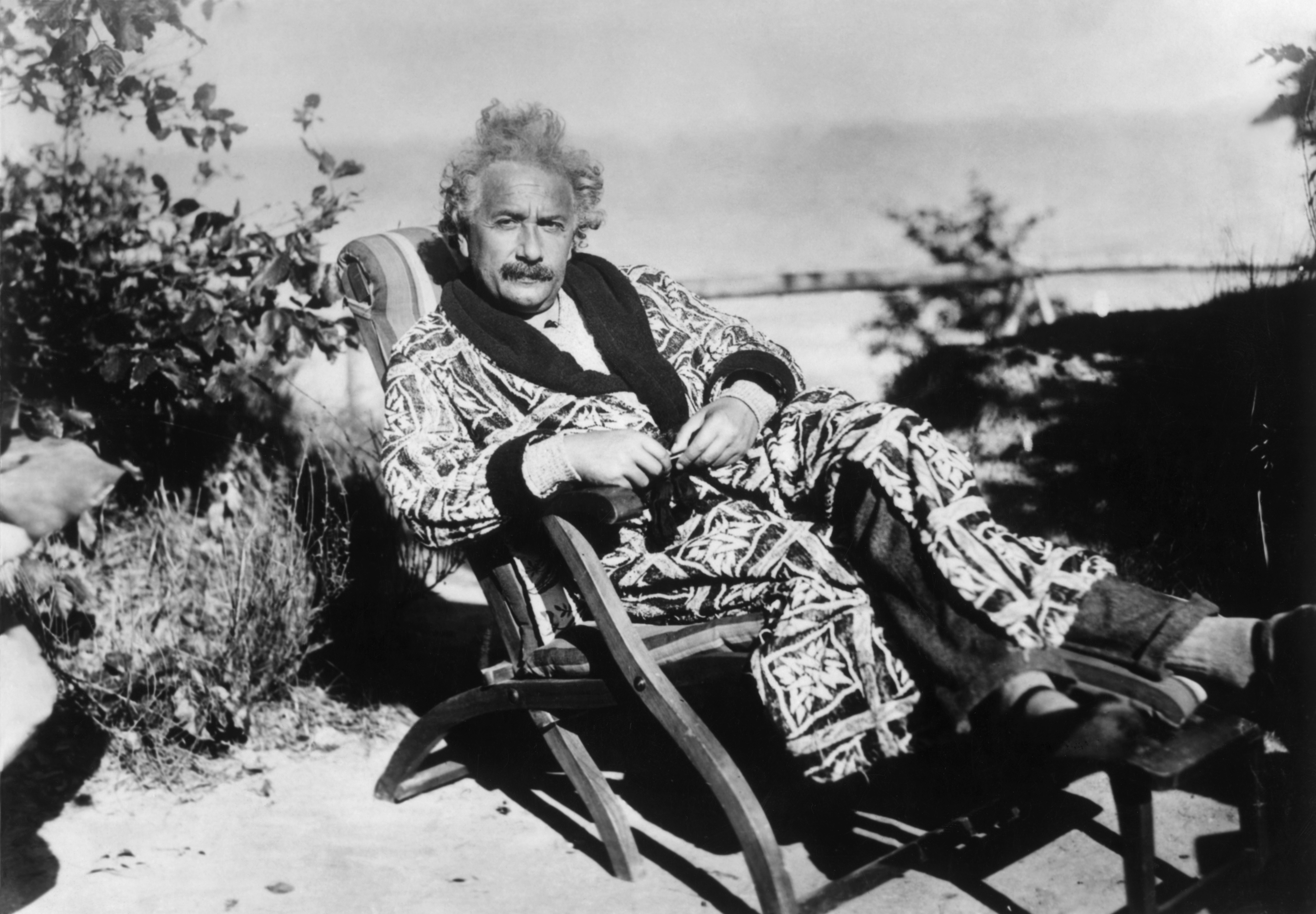
His political universe
Driven by his realist methodology, Einstein wasn't afraid to toss away months or even years of physics work if it failed to fit all the data. He took a similar approach to the social sphere: Albert resisted entrées from ideological extremists of all stripes looking to co-opt his celebrity. When he did back a cause, he was never afraid to recalibrate if new information came to light.
Convinced in part by discussions with no less a figure than Sigmund Freud of the detrimental impulses of what we, today, might call "toxic masculinity," Einstein became a devout pacifist. Beginning in the 1920s, he advocated for complete disarmament and central controlled by a worldwide government.
With the specter of rising Nazism, Einstein altered this stance. He hated and feared the blind nationalist, ethno-nativist ideology ascendant in Germany. Consequently, by 1931 he was rebuffing the invitations from pacifist organizations to speak on behalf of their cause. But he clung to the concept of a "supranational" peace-keeping body.
He was, however, far from politically impeccable. Einstein passed up opportunities to condemn Stalin's brutality, giving ammunition to those who would paint him as pro-Soviet.
Albert loved America. Emigrating in 1933, he was taken by the depth of free speech he heard around him. Protection of unrestricted expression under the U.S. Constitution's primary amendment suited his non-conformist personality. He sensed in the citizens a tolerance for divergent opinions. I wonder if he'd be disappointed in us, today
The quantum conundrum
Einstein's core belief that there should be a root simplicity underlying the most complex, gnarly rat's nests of data likely allowed him to be a happier, more settled man. This same propensity kept him from accepting foundational discoveries made by younger physicists. He tried to his death to collapse the strong and weak nuclear forces into electromagnetism and gravity. Yet the four-force model stands today.
Einstein seemed especially intractable when it came to quantum mechanics. In a way, he had sparked the quantum revolution that he would spend the rest of his working life trying to quell: His 1906 paper had lit a beacon pointing at the fundamental quantum of light as a particle, what we now call a photon.
By the early 1920's younger physicists — particularly one cluster in Copenhagen — had coalesced around physicist Werner Heisenberg's conjecture that we can never know both the exact position of any particle and its precise momentum. Observing one aspect negates the other, with the philosophical implication that certainty can never exist.
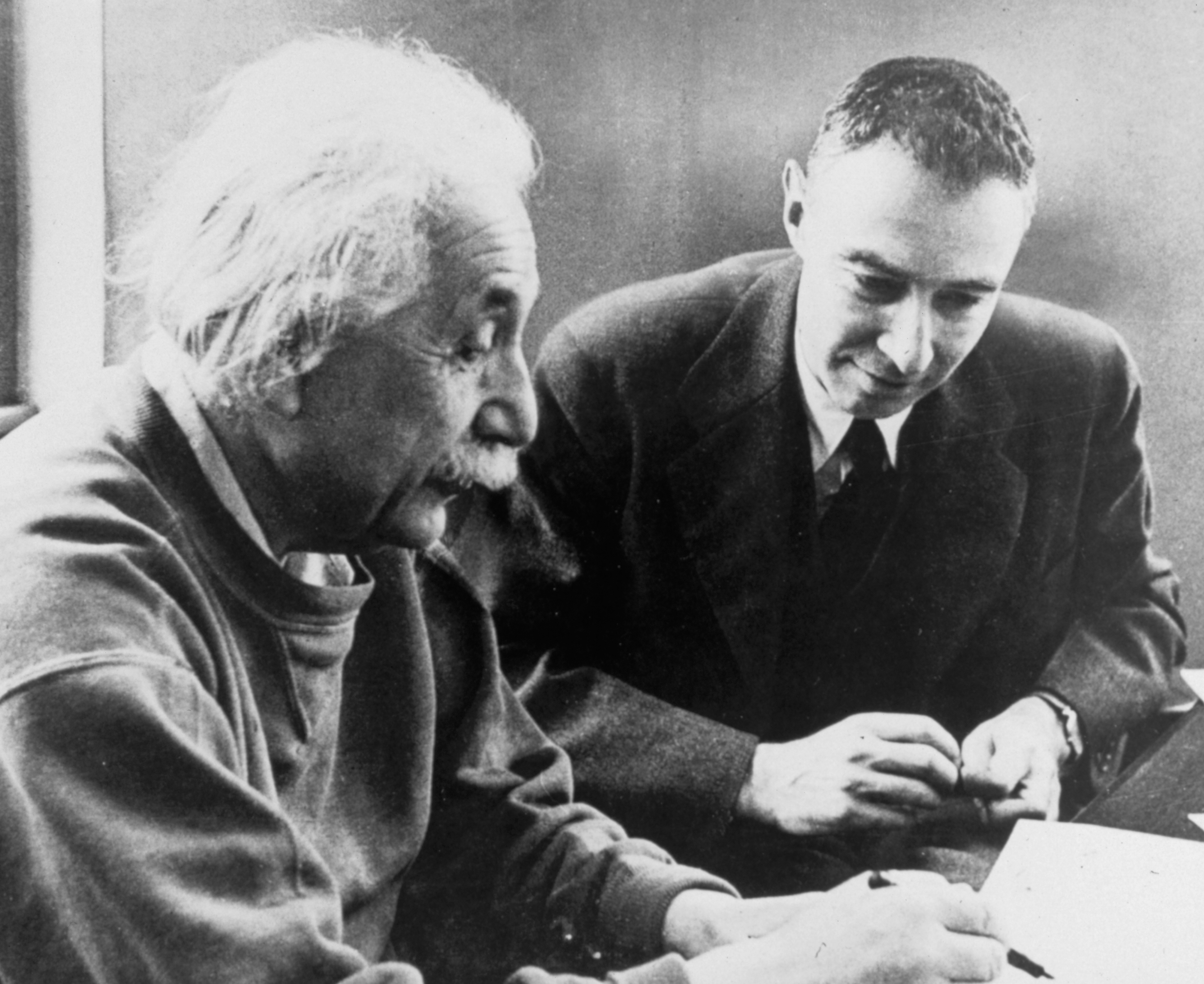
Einstein could stomach a universe of gambler's chance. He clung to his belief in the power of field theories with a faith resembling religious fervor. Matter, by Einstein's approach, would never actually granularize into particles. Objects, whether gargantuan or tiny, should all be seen as localized concentrations of very strong fields. It felt counterintuitive, but then so had relativity.
Einstein seemed to regard the messy probability-calculus of quantum mechanics as magical mysticism and superstition, while clinging to his own blind conviction in elegant simplicity as fundamental truth.
We still don't know for sure who is right. But at least Einstein's approach leaves us with a comfortable confidence; an understandable universe implying a planet Earth worth protecting. If it's all merely hierarchies of chance — or just a simulation — we might feel small, marginalized by the universe; free to throw up our hands and just watch the world burn.
The peaceful atom
In September 1905, Einstein had quietly published his revelation that an enormous amount of potential energy lies contained in tiny amounts of matter by a formula which later crystalized as E=mc^2. In August 1939, faced with heartless totalitarianism rising in Europe, Einstein leveraged his notoriety to help warn President Franklin Roosevelt that "extremely powerful bombs" were becoming possible.
Einstein was spared direct participation in nuclear weapons research by the FBI's wholly incorrect suspicion that he harbored pro-communist leanings and, likely, by an implicit bias against Jews. Einstein, whose humanitarian bent vectored him toward pacifism, had little interest in hands-on bomb building. [But he did help when asked, devising a gaseous diffusion scheme to filter isotopes of uranium.]
Einstein, the revealer of atomic energy, was among the first to realize that "a nuclear war cannot be won and must never be fought," as U.S. President Ronald Reagan and Soviet General Secretary Mikhail Gorbachev would later jointly codify in 1985.
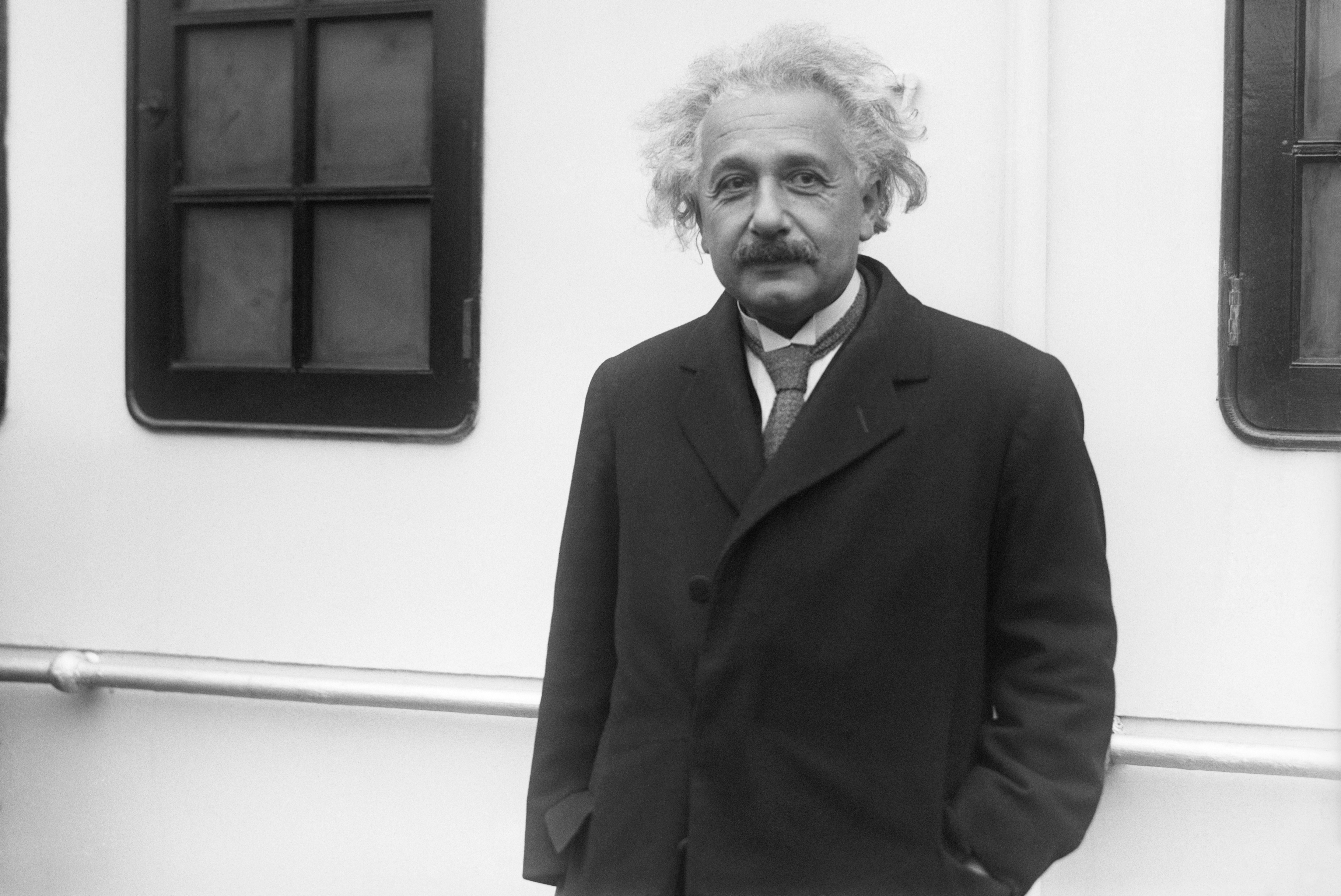
It is, today, up to us decide whether to use Einstein's energetic atoms for horrific destruction or environmental salvation. If we can trust one another to safely managing nuclear power sources, we might radically reduce the dual catastrophe that is the hydrocarbon economy: Autocrats arise on fortunes floated by oil, gas and coal. Island and low-lying nations sink on greenhouse climate disruptions.
Of special interest to we who frequent these Space.com pages: Nuclear-thermal, nuclear-electric and fusion rockets could quickly give us the entire solar system. It's also worth remembering that our current missions to planets, moons, asteroids and comets depend on the degree to which the spacetime around objects of various masses is deformed, calculations first made in 1937 by Einstein with physicists Banesh Hoffman and Leopold Infeld.
It is fashionable today to admonish one another for not "being present." Einstein succeeded because he could be absent. Colleagues noticed he could delicately disappear from conversation to drift in (outwardly) passive contemplation. His comfort with — indeed his desire for — apartness let him work free of distractions.
Einstein, the realist-dreamer, presents a paradox. His longing for a world-inclusive peace-keeping organization, possessing more military power than any one nation, has proven as unrealistic as a grand unified field theory explaining all the universe's elastic clockworks. Yet Einstein never gave up either vision.
Some lessons are clear: This moment's media zone is flooded with disinformation, misinformation, "alternative fact," propaganda and marketing spin. The signal to noise ratio of social media far worse than most phenomena in the natural world. Consumers seem increasingly ill-equipped to separate truth from bunk. Good-natured skepticism of the sort Einstein personified can inoculate us against this viral epidemic of fakery.
In honor of Albert, we could refrain from branding those with whom we disagree as villainous traitors without incontrovertible evidence; something done thousands of times an hour on Twitter. Better to go quiet. Think it through. Try an Einsteinian "thought-experiment" in which your challenger is not inherently evil. Realize the tiny dimensions of the human domain. Wonder at the amazing comprehensibility of nature. Marvel at the power of the processes out there. And turn the currently destructive tone of our shared universe inside out.
Stream/dDownload the song: https://davidsbrody.hearnow.com/.
Follow Dave Brody on Twitter @DavidSkyBrody and see his filmography on IMDB Profile. Follow us on Twitter @Spacedotcom or on Facebook.
